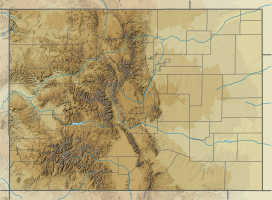Mount Richthofen is the highest summit of the Never Summer Mountains range of the Rocky Mountains of North America. The prominent 12,945-foot (3,946 m) peak is located 5.6 miles (9.0 km) northwest by west (bearing 308°) of Milner Pass, Colorado, United States, on the Continental Divide separating the Rocky Mountain National Park Wilderness in Rocky Mountain National Park and Grand County from Routt National Forest and Jackson County.[1][2][3] The mountain was named in honor of pioneering German geologist Baron Ferdinand von Richthofen, apparently by Clarence King's 1870 survey team.[4]
| Mount Richthofen | |
|---|---|
 Mount Richthofen, the high mountain in the center, as seen from Diamond Peaks to the north. | |
| Highest point | |
| Elevation | 12,945 ft (3,946 m)[1][2] |
| Prominence | 2,680 ft (817 m)[2] |
| Isolation | 9.66 mi (15.55 km)[2] |
| Listing | Colorado prominent summits Colorado range high points |
| Coordinates | 40°28′10″N 105°53′42″W / 40.4694275°N 105.8950133°W[3] |
| Naming | |
| Etymology | Ferdinand von Richthofen |
| Geography | |
| Location | Continental Divide between Rocky Mountain National Park in Grand County and Jackson County, Colorado, United States[3] |
| Parent range | Highest summit of the Never Summer Mountains[2] |
| Topo map(s) | USGS 7.5' topographic map Mount Richthofen, Colorado[3] |
| Geology | |
| Rock age | 20-25 myo |
| Mountain type | Andesite |
| Climbing | |
| First ascent | William S. Cooper 1908 |
| Easiest route | class 3 scramble |
Mountain
editNeedles and Grenadiers explorer William S. Cooper climbed Mount Richthofen by himself in 1908 in what is presumed to be the first ascent in historic times by Americans of European descent. No sign of previous climbers were present at that time.[5]
Today, the mountain is typically climbed from Lake Agnes to the north, easily reachable from Cameron Pass. The mountain is a steep Class 3 climb that often requires travel on steep scree slopes that are not very stable.
Climate
editAccording to the Köppen climate classification system, the mountain is located in an alpine subarctic climate zone with cold, snowy winters, and cool to warm summers.[6] Due to its altitude, it receives precipitation all year, as snow in winter, and as thunderstorms in summer, with a dry period in late spring.
See also
editReferences
edit- ^ a b The elevation of Mount Richthofen includes an adjustment of +1.658 m (+5.44 ft) from NGVD 29 to NAVD 88.
- ^ a b c d e "Mount Richthofen, Colorado". Peakbagger.com. Retrieved October 21, 2014.
- ^ a b c d "Mount Richthofen". Geographic Names Information System. United States Geological Survey, United States Department of the Interior. Retrieved October 21, 2014.
- ^ Dziezynski, James (1 August 2012). Best Summit Hikes in Colorado: An Opinionated Guide to 50+ Ascents of Classic and Little-Known Peaks from 8,144 to 14,433 Feet. Wilderness Press. p. 92. ISBN 978-0-89997-713-3.
- ^ William M. Bueler (2000). Roof of the Rockies: a history of Colorado mountaineering. The Colorado Mountain Club Press. p. 94.
- ^ Peel, M. C.; Finlayson, B. L.; McMahon, T. A. (2007). "Updated world map of the Köppen−Geiger climate classification". Hydrol. Earth Syst. Sci. 11. ISSN 1027-5606.
External links
edit
